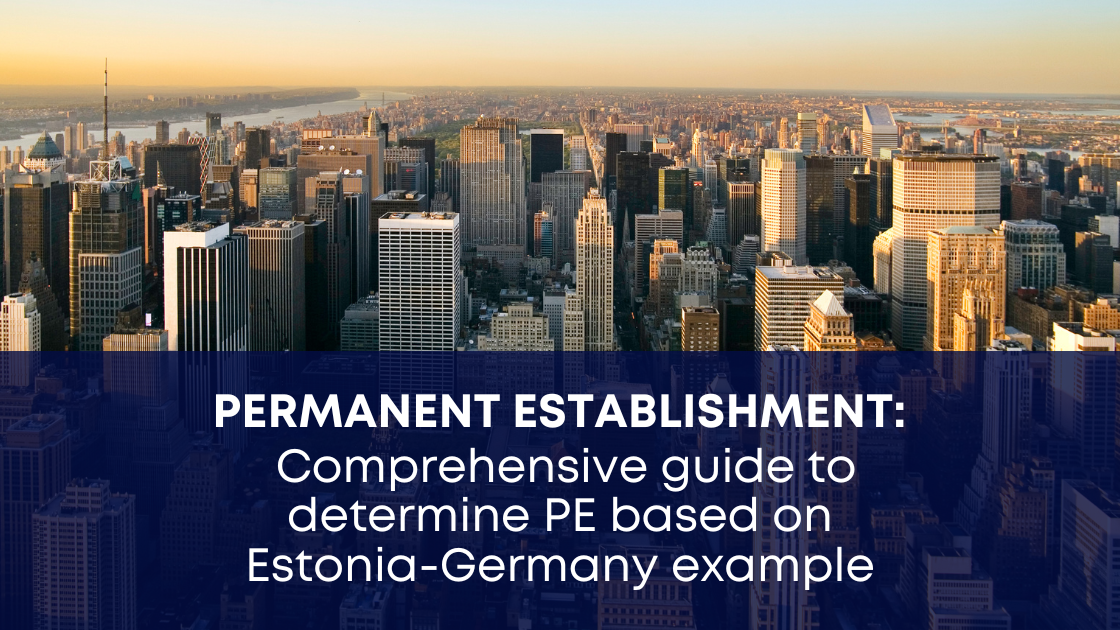How do you determine a permanent establishment?
This information is based on the double taxation avoidance agreement between Estonia and Germany.
We have received a lot of questions about the permanent establishment and double taxation in relation to German residents/citizens wanting to establish a company in Estonia. In this article we will cover general guidelines of how a permanent establishment is recognized and measures against double taxation based on the double taxation avoidance agreement between Estonia and Germany.
NB! This blog post does not constitute as legal advice, and your situation should be analysed only on your specific circumstances. To get answers to your tax questions book a consultation with us via website or write us directly at: info@silvahunt.ee
The role of a permanent establishment when paying taxes
If you’re an e-Resident, it’s crucial to understand the concept of a ‘permanent establishment’ (PE). This term refers to whether you’ll need to pay taxes in another country, besides the one where your business is registered. According to the double tax avoidance agreement between Germany and Estonia, a ‘permanent establishment’ is defined as: a fixed place of business through which the business of an enterprise is wholly or partly carried out (Article 5, section 1).
PE rules are an exception from the general taxing rules. This means, that another country will get the right to tax first than the state which your company is registered in. This was put to place to ensure that taxes would also get paid if you would choose to operate your enterprise in another country.
It is important to note that a permanent establishment can not be created in the country where your company was established. An Estonian company does not have a PE in Estonia, it has tax residency in Estonia. If you register your Estonian limited liability company(OÜ) in the Estonian business register your enterprise will be regarded as a tax resident in Estonia. You can issue a Certificate of Residence from the Estonian tax authorities for free, find out more about it here.
What is considered a permanent establishment (PE) according to the Estonia-Germany tax treaty?
The term “permanent establishment” includes especially:
a) a place of management;
b) a branch;
c) an office;
d) a factory;
e) a workshop, and
f) a mine, an oil or gas well, a quarry or any other place of extradition of natural resources.
(3) A building site, a construction, assembly or installation project or a supervisory activity connected therewith constitutes a permanent establishment only if it lasts more than nine months.
In addition to this a permanent establishment also starts to apply when there is a person acting on behalf of a company, they are also entitled to sign contracts concerning business activities (e.g. an authorized employee, a board member).
A fixed location is not needed to trigger a PE in the case of an agent. PE depends on the nature of the agent’s activities.
What is not a PE?
It would not be considered a permanent establishment if:
- you solely use a place to store your products or buy new ones;
- place meant for displaying products;
- where your products are delivered.
An enterprise will not have a permanent establishment trough an independent agent – a broker, general commission agent or any other agent of an independent status, provided that such persons are acting in the ordinary course of their business (Article 5, section 6 ). Meaning they are not doing full-time work for you. These conditions with the agent are dependent on the industry you are in and should be looked into case by case.
Where is my PE if I have a digital product?
In our webinars we often encounter the question, where would one have a permanent establishment, if they have a company, which sells digital products and are living in Germany, for example.
In this example: you are the only owner of your company, managing your Estonian OÜ from Germany, you sell digital products and your clients are all around the world.
Since you are living in Germany, it means you are operating your enterprise there, which most likely could trigger PE in Germany for your Estonian company. As the permanent establishment definition states, the place where you operate your business is where you end up paying taxes, regardless if your product is digital or not.
Will Germany tax the income I made with my OÜ in Estonia?
To identify where and which taxes should be paid the following key questions need to be answered:
- Where do Board members live? Are they perpetual travellers or residents in one country?
- Where do the board members take decisions?
- Where are your clients? Worldwide or in one country?
- How is your company structured?
- Do you have a holding structure?
Thereby, this question can have multiple answers, depending on your specific situation. We strongly recommend to consult a tax advisor in this matter – we have several partners who are specialised in International Tax Law and also partners who are specialists in German Tax Law. You can learn more about our Tax and Legal advisers HERE.
If you have a permanent establishment in Germany and earn income from Estonia, and have paid your Estonian taxes, a tax credit may apply that takes the paid Estonian tax amount into account. Germany has a list (in Außensteuergesetz) of income activities that are applicable for a tax credit when you earn income in Estonia. Get in touch so we can learn your specific situation and assist you accordingly.
Is determining a permanent establishment different for a holding company?
A holding is a company that owns another company. Establishing a holding company as a shareholder in your existing companies or other investment vehicles is a great way to secure your assets from your operating company to grow money long-term.
A holding is a passive company, which makes it easier to prove that the place of active management is in Estonia. Find out why in this interview with Christoph Huebner.






